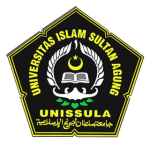Penyuluhan kesehatan reproduksi pada siswa-siswi SMP Negeri 02 Getasan
DOI:
https://doi.org/10.61251/cej.v2i4.91Keywords:
Remaja, kesehatan reproduksiAbstract
Masa remaja adalah fase penting yang menandai peralihan dari anak-anak menuju dewasa. Fase ini sangat krusial karena menjadi penentu masa depan bangsa. Kesehatan reproduksi remaja mencakup kondisi sehat yang berkaitan dengan sistem, fungsi, dan proses reproduksi. Edukasi mengenai kesehatan reproduksi sangat penting untuk mencegah terjadinya kekerasan dan penyimpangan seksual. Kurangnya edukasi bisa menyebabkan seks bebas, kekerasan seksual, dan perilaku menyimpang. Tujuan dari kegiatan ini adalah mengukur pengetahuan siswa-siswi SMP N 02 Getasan tentang kesehatan reproduksi. Populasi dalam penyuluhan ini sejumlah 60 siswa-siswi SMP N 02 Getasan. Dari hasil penyuluhan yang telah dilakukan oleh KKN Kelompok 79 UNISSULA Semarang dengan pemateri berjumlah 2 orang, siswa-siswi aktif berdiskusi dan memahami pubertas serta kesehatan reproduksi. Metode pendekatan yang kami gunakan dan lakukan adalah metode deskriptif kualitatif, yakni metode pelaksanaan yang dilakukan dengan memanfaatkan berbagai data kualitatif dan dijabarkan dengan deskriptif kepada para audiens penyuluhan. Hasil dari penyuluhan ini menunjukkan adanya peningkatan signifikan dalam pengetahuan remaja putra dan putri mengenai kesehatan reproduksi. Peningkatan ini terbukti melalui hasil nilai pre test dan post test dengan hasil sebelum diberikan penyuluhan pengetahuan tentang Kesehatan reproduksi Sebagian besar pengetahuannya kurang (40%) meningkat menjadi pengetahuan baik sebesar 85 % setelah diberikan penyuluhan. Hal ini menunjukkan mayoritas remaja di SMP N 02 Getasan telah memiliki pengetahuan dan sikap yang baik terkait kesehatan reproduksi.
Adolescence is an important phase that marks the transition from childhood to adulthood. This phase is very crucial because it determines the future of the nation. Adolescent reproductive health includes healthy conditions related to the reproductive system, function, and process. Education about reproductive health is very important to prevent violence and sexual deviation. Lack of education can lead to free sex, sexual violence, and deviant behavior. The purpose of this activity is to measure the knowledge of students of SMP N 02 Getasan about reproductive health. The population in this counseling was 60 students of SMP N 02 Getasan. From the results of the counseling that has been carried out by KKN Group 79 UNISSULA Semarang with 2 speakers, students actively discussed and understood puberty and reproductive health. The approach method that we use and do is a qualitative descriptive method, namely an implementation method that is carried out by utilizing various qualitative data and described descriptively to the counseling audience. The results of this counseling show a significant increase in the knowledge of male and female adolescents about reproductive health. This increase is proven through the results of the pre-test and post-test scores with the results before being given counseling on reproductive health knowledge. Most of their knowledge was lacking (40%) increasing to good knowledge by 85% after being given counseling. This shows that the majority of teenagers at SMP N 02 Getasan have good knowledge and attitudes related to reproductive health.
References
World Health Organization. (2024). Adolescent health. Retrieved from https://www.who.int/health-topics/adolescent-health#tab=tab_1
Emry Handany Lede, M., Suwetty, A. M., Bend Yunita Pellondou Program Studi, K. D., Maranatha Kupang, Stik., Kampung Bajawa, J., Baumata Barat, N., & Tenggara Timur, N. (2024). Pengaruh Penggunaan Media Sosial Dengan Tingkat Pengetahuan Tentang Kesehatan Reproduksi Remaja (Krr). JKJ): Persatuan Perawat Nasional Indonesia, 12(2), 401–406.
Fatoni, Z., Astuti, Y., Situmorang, A., NFN, W., & Purwaningsih, S. S. (2015). Implementasi Kebijakan Kesehatan Reproduksi Di Indonesia: Sebelum Ddan Sesudah Reformasi. Jurnal Kependudukan Indonesia, 10(1), 65. https://doi.org/10.14203/jki.v10i1.56
Johariyah, A., & Mariati, T. (2018). Efektivitas Penyuluhan Kesehatan Reproduksi Remaja Dengan Pemberian Modul Terhadap Perubahan Pengetahuan Remaja. Jurnal Manajemen Kesehatan Yayasan RS.Dr. Soetomo, 4(1), 38. https://doi.org/10.29241/jmk.v4i1.100
Mahmudah, N. (2022). Edukasi Kesehatan Reproduksi Pada Remaja. Jurnal Abdimas: Pengabdian Dan Pengembangan Masyarakat, 4(2), 24–28. https://doi.org/10.30630/jppm.v4i2.909
Muharrina, C. R., Yustendi, D., Sarah, S., Herika, L., & Ramadhan, F. (2023). Kesehatan Reproduksi Reproductive Health. Jurnal Pengabdian Masyarakat Kebidanan, 5(1), 26–29. https://doi.org/10.26714/jpmk.v5i1.11507
Nihayatul Hidayah Marisita, Zuhroidaturrahmah, A., Nurfatimah, A. S., & Aini, N. N. (2024). Urgensi Pemahaman Kesehatan Reproduksi Remaja Sebagai Bekal Pencegahan Stunting Di Desa Mendalanwangi Kecamatan Wagir. MEUSEURAYA - Jurnal Pengabdian Masyarakat, 3(1), 12–26. https://doi.org/10.47498/meuseuraya.v3i1.2870
Rohan, H. H., & Siyoto, S. (2013). Buku ajar kesehatan reproduksi. Nuha Medika
Starrs, A. M., Ezeh, A. C., Barker, G., Basu, A., Bertrand, J. T., Blum, R., Coll-Seck, A. M., Grover, A., Laski, L., Roa, M., Sathar, Z. A., Say, L., Serour, G. I., Singh, S., Stenberg, K., Temmerman, M., Biddlecom, A., Popinchalk, A., Summers, C., & Ashford, L. S. (2018). Accelerate progress—sexual and reproductive health and rights for all: report of the Guttmacher–Lancet Commission. The Lancet, 391(10140), 2642–2692. https://doi.org/10.1016/S0140-6736(18)30293-9
Violita, F., & Hadi, E. N. (2019). Determinants of adolescent reproductive health service utilization by senior high school students in Makassar, Indonesia. BMC Public Health, 19(1), 1–7. https://doi.org/10.1186/s12889-019-6587-6
Downloads
Published
How to Cite
Issue
Section
License
Copyright (c) 2024 Machfudloh Machfudloh, Regitasari Setyaning Uttami, Vita Ayu Tegar Khamareta, Agil Ahmad Syamsudin, Enjelika Dwi Amelia, Salwa Alya Azzahra, Niswatun Khoeriyah, Putri Agustine Mulyani, Rizal Arif Setiawan, Vina Rismawati, Muhamad Ilham Zauhari

This work is licensed under a Creative Commons Attribution 4.0 International License.
The journal's license is under Creative Commons Attribution 4.0 International License that allows others to share the work with an acknowledgement of the work's authorship and initial publication in this journal.










